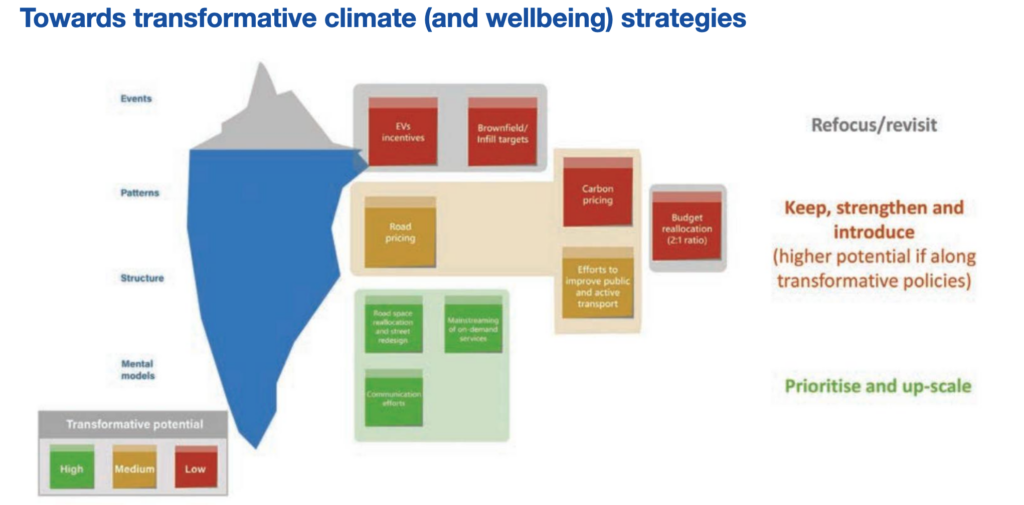Redesigning Irish transport for net zero

Aimée Aguilar Jaber, Programme Lead for systems thinking and transformative change for net zero and resilience at the OECD and author of the OECD’s Redesigning Ireland’s Transport for Net Zero report, speaks to eolas Magazine about the report and the Government’s response to it.
Aguilar Jaber credits an Irishwoman – Gemma O’Reilly, a member of the Climate Change Advisory Council at the time of the project, and now a Policy Analyst for the National Economic and Social Council – with the genesis of the collaboration between the OECD and the Irish Government, which was the “first time that we put the systems innovation for net zero approach into a detailed country case study”.
By undertaking a systemic approach to its analysis, the OECD stated that the Irish transport system fosters growing car use by design and is thus unfit for reaching Ireland’s greenhouse gas emissions reduction goals and achieving wellbeing for Irish citizens.
“Bringing systems-thinking to climate action allowed understanding that a very important first step was to reframe policy and its focus,” Aguilar Jaber says.
“Policy often focuses on the tip of the iceberg, for instance on the patterns of behaviour that we have seen in the past. The problem with that is that if policymaking remains at the tip of the iceberg, its logic is about reacting to events or at most anticipating patterns that we see as inevitable, giving us policies that are solely focusing on trying to reduce the harm of unsustainable systems by improving their parts – often via technological change – but that are not doing much about improving the system itself.
“This project was about inviting stakeholders to think differently; what if we do not focus only on the trends that we see? What if we try to focus on what is behind those trends?” she says.
With private car dependence an acute challenge in the Irish case amidst a lack of public transport options outside of Dublin – Ireland has the second highest car dependency rate (76 per cent of people in the State use the car as their main form of transport) in the EU and rail travel accounts for just 3 per cent of passenger kilometres per annum, significantly lower than the European average of 8 per cent – Aguilar Jaber says that part of the project entailed challenging assumptions around car use.
Accepted thinking states that private car kilometres driven rise with gross national income, for example, leading to a summation that personal wealth makes it more likely that an individual will use a private mode of transport.
“What is behind this specific trend is the system structure of a car dependent system. In a car-dependent system, we have induced demand, which is the phenomenon by which authorities expand road infrastructure, creating more demand; we have sprawl, because more car purpose capacity has made it possible for people to leave the areas where services are concentrated, and it becomes much more difficult for public and active transport to reach everywhere and be competitive.”

Aguilar Jaber says that challenging these assumptions also requires challenging the idea of car ownership as symbol of status and life quality.
“We did so by going through three different steps in collaboration with an array of Irish stakeholders: the first step was to envision a future where transport was bringing wellbeing; we then needed to understand the system that today does not bring wellbeing but brings unsustainable results; only then could we find the policies that would redesign the system so that it can become sustainable and bring wellbeing by design,” she says.
Redesign of the system is key in the Irish context, where, as the OECD report stated, even transport decarbonisation efforts have historically had a heavy bias towards private car ownership, relying on the hope of swapping from internal combustion (IC) engines to electric vehicle.
“Policies such as incentives for private EVs help to maintain the lock-in of the car-dependent system and do not support systemic change. These incentives are also less powerful and slower than usually perceived and have proven regressive. Electrifying the sector will still play a key role, but embedding the electrification strategy in the shift away from car dependency can make electrification faster, more effective, and more equitable,” Aguilar Jaber says.
“We were also able to understand what other policies have low or medium transformative potential,” she adds. “We are not necessarily saying that any policies with low or medium potential need to be replaced – there are some that are important to finance and speed up the transition such as carbon and road pricing – but it is important to understand that some of these policies can slow down the vicious cycle, but they will not shift the system away from car-dependency on their own.”
Outlining policies crucial to such a shift, Aguilar Jaber mentions three in particular: “Road space reallocation and street redesign allow us to rebalance space (a critical stock in the system) and utilise it in a wiser, more efficient, and more equitable way. This has the potential of changing current dynamics and producing more virtuous ones, for example generating disappearing traffic instead of induced demand. We also see the mainstreaming of shared on-demand services as a policy with high transformative potential, which could bring relevant well-being benefits, and that is currently underutilised in Ireland. These services need to support, not substitute for, public transport and with the right regulation and planning, they can. Communication efforts are also transformative if they can start the shift away from this car-centric mindset. It is important for the Government to start communicating in another way. Private EVs should not be talked about as zero emissions vehicles, and we state that in the report.”
The Government’s response to the report has been positive, the Programme Lead says, offering encouragement in the policy shifts evident from Climate Action Plan 2021 to its 2023 successor. “In line with the recommendations of the report, we see key differences with the 2021 version,” she says. “For example, we have a total traffic volume reduction rather than just an IC-traffic reduction target, we have a very important role for modal shift, and we have targets that are ambitious for public transport and active and shared mobility. The new Sustainable Mobility Policy (SMP) already showed increased focus on policies identified as transformative but the alignment of targets and strategies in the CAP with systemic change are crucial and make of Ireland an international reference of good practice. We see government officials in other countries increasingly becoming interested in knowing more about the process behind the changes undertaken by Ireland.”
Concluding, Aguilar Jaber says that the collaboration between the OECD and relevant Irish stakeholders was key to the project and its ability to interrogate the systemic issues inhibiting the efforts to tackle Irish transport emissions: “This was a project that started with a brave question from one person and that ended up bringing together a community of systems-thinkers that were willing to question the way they were doing things and to bring the systemic perspective to say that it is not solely about people having the awareness to choose better. We need a better system; we need to offer a better system if we are going to ask for large-scale widespread behavioural change.”





